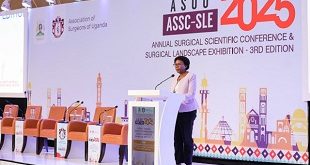Witnessed the extraordinary
The exact reasons for Grandi’s recent visit remain unclear although he noted in the tweet he sent out on the day before flying that his tour was an “opportunity to thank Ugandans for their hospitality, help mobilise resources and pursue solutions for forced displacement in the region.”
“On my way to Uganda, which hosts almost 1.5 million refugees and has some of the most progressive asylum policies in Africa and globally,” Grandi tweeted, on March 07.
Over the course of four days, starting March 8-11, Grandi visited refugee settlements in Uganda’s West Nile region, met and held talks with President Yoweri Museveni, Moses Ali, the First Deputy Prime Minister, members of the diplomatic corps, the World Bank, UN agencies, non-governmental organisations and the Comprehensive Refugee Response Framework Steering Group – the main decision-making body for the implementation of the global compact on refugees in Uganda.
On March 9, Grandi travelled to Uganda’s northwestern region of West Nile which hosts over a million refugees. Accompanied by Jennifer Namuyangu, the Minister of State for Local Government, Grandi visited Bidi Bidi settlement, the 250 sq km sprawl that hosts about 235,000 South Sudanese refugees. It is currently one of the largest in the world.
“Back in Uganda’s West Nile after three years; today in Bidi Bidi, one of the world’s largest refugee settlements. I saw big progress. Thanks to Uganda’s inclusive “refugee model” and to donors support. Both remain crucial to ensure the welfare of those displaced and of their hosts,” he tweeted again on March 09.
During a four-hour tour of Africa’s largest refugee settlement and surrounding areas, Grandi and government officials toured donor-supported projects which are benefitting both the refugees and the host communities.
One project, in the settlement’s Zone III, for instance, now hosts the largest solar powered water system across the entire refugee response, serving more than 18,000 refugees and Ugandans. Completed in 2019 with funding from the European Civil Protection and Humanitarian Aid Operations (ECHO), the German Development Bank (KfW) and the United Kingdom, the system will soon be handed over to the Northern Umbrella Authority for Water and Sanitation, under the Ministry of Water and Environment, following capacity-building by the German International Cooperation (GIZ) and the World Bank.
At Twajiji Primary School, the delegation saw new classrooms and teachers’ accommodation facilities built with contributions from KfW. The UNHCR helps with the daily running of the school, paying the teachers’ salaries.
Still, in Yumbe town, Grandi saw another primary school built two years ago, in 2019, under the Development Response toDisplacement Impacts Project (DRDIP), a government flagship initiative, supported by the international community through the World Bank, to improve access to basic social services in areas that host refugees.
While driving through Bidibidi and Yumbe town, Grandi noted hundreds of electric poles and cables, evidence of a project already underway to connect the settlement to the national grid. This project is being financed by Norway and implemented by the government’s Rural Electrification Agency—an initiative which is part of a broader collaboration between the Norwegian Agency for Development Cooperation, GIZ and the World Bank to extend the national grid to refugee-hosting areas.
When the Bidibidi electric grid goes live, the UNHCR intends to support the “last mile connection” for schools, health centres and markets.
“This could be a game changer for the further development of the settlement and its surroundings,” Grandi said noting that “in a matter of four years, we are seeing vast improvements to remote rural areas that host refugees.”
At Apo Health Centre III, Grandi toured a government-run facility which the UNHCR equipped with five isolation units last year to strengthen COVID-19 infection, prevention and control measures, in partnership with ECHO.
While on a brief stop at a women’s centre, Grandi met with 39-year-old Margaret Kuyunge, a refugee from South Sudan who represents her community at the national Refugee Engagement Forum – a platform established in 2018 to ensure the views and concerns of refugees inform strategic discussions and decision-making.
“In my new role, I feel the voice of my community can be heard where it really matters. We are not just people with needs…we have provided our skills, dreams and contributions to our communities,” Kuyunge said.
“What I witnessed in Yumbe is extraordinary,” Grandi said adding that Uganda has shown strong leadership in moving the Global Compact on Refugees forward. “This settlement realises the vision for shared responsibility and a comprehensive response to refugee crises and gives me fresh confidence that the Global Compact on Refugees can be successfully operationalized worldwide.”
Speaking shortly after his tour of West Nile, Grandi said “all stakeholders should remain engaged at the highest level to ensure the success of the Uganda comprehensive refugee response.”
He said “collective efforts are needed to address the humanitarian-development nexus and accelerate the transition to sustainable local government services.” “The Uganda refugee model remains a refugee model of global importance,” Grandi said.
“Uganda is proud to lead a positive narrative on refugees and to demonstrate not only our humanity, but together with refugees and host communities can thrive,” said Minister Namuyangu adding that the economic and social benefits for the host communities are undeniable.
However, Namuyangu noted that, “a more cohesive and sustained international response is needed to ease pressure on local communities and to strengthen further the capacity of local service delivery as the refugee population continues to grow.”
****
 The Independent Uganda: You get the Truth we Pay the Price
The Independent Uganda: You get the Truth we Pay the Price




Uganda is also one of the largest refugee-hosting countries in Africa. hopefully he will mobilize international communities to support the cause.